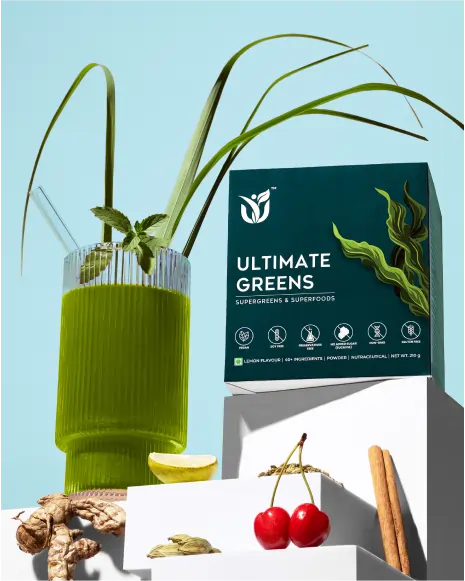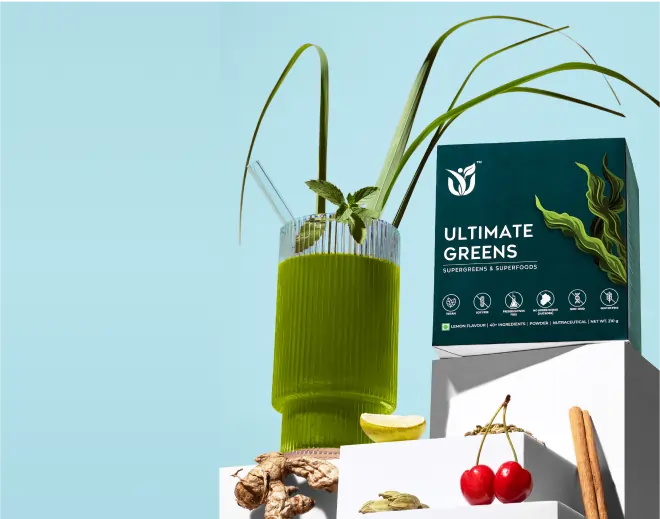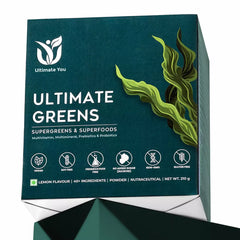Fuel your workouts with Spirulina! This nutrient-packed superfood enhances stamina, supports muscle recovery, and improves overall athletic performance for faster results.
Did you know that Spirulina contains 60-70% of protein? This can supplement protein needs, especially in low-protein diets. During intensive activity, athletes often push themselves to the limit, leading to increased oxygen absorption and metabolism. This process can produce harmful oxygen radicals, which are toxic and potentially carcinogenic, posing significant risks to the athletes.
In this context, antioxidants become vital in defending the body against oxidative damage. Although supplements may help athletes prevent tissue damage from exercise, opinions on their benefits vary. Across the globe, they act as an energy booster, a superfood for health freaks and nutrient-deficient folks.
Let's delve into the topic of how spirulina benefits athletes in their sports performance.
What is Spirulina?
Spirulina, typically known as blue-green algae, is a popular plant-based protein with notable antioxidant and performance-enhancing properties. The nutrient-dense superfood spirulina powder promotes the immune system and gastrointestinal health.
Constituting 60-70% protein, spirulina comprises all essential amino acids, making it a complete protein source. In addition, it contains high concentrations of bioactive compounds, fatty acids, vitamins, minerals, and potent antioxidants like selenium, beta-carotene, vitamin C, and vitamin E, all of which help athletes' antioxidant status.
Another crucial aspect of spirulina's nutritional value is its antibacterial qualities. These qualities are instrumental in fighting infections, a vital factor in maintaining an athlete's health and performance. Additionally, its prebiotic fibre supports healthy gut flora, further boosting energy levels.
Spirulina’s Nutritional Profile
Spirulina contains micronutrients such as potassium and sodium, which help control fluid balance, muscular contraction, and nerve impulses. Its excellent nutritional profile balances the body’s needs for all age groups and lifestyles. It contains more calcium than whole milk, making it the best option for milk haters.
Nutritional information per 100g
|
Nutrients |
Per 100g |
|
Energy |
290 kcal |
|
Carbohydrates |
24 g |
|
Proteins |
60-70 g |
|
Fats |
8 g |
Spirulina and Athletic Performance
Increased Fat Oxidation Rate
Spirulina supplementation significantly improves exercise performance by increasing fat oxidation during a 2-hour exercise. This helps preserve glycogen stores, which are necessary for sustaining maximal aerobic power output. By sparing glycogen or glucose, spirulina enables athletes to maintain high-intensity exercise for more extended periods.
Elevated Glutathione (GSH) concentration
Studies show that taking spirulina can help you perform better during exercise. Spirulina provides essential nutrients that help increase glutathione (GSH) levels, which are necessary for regulating reactive oxygen and nitrogen species and improving muscle function. The vitamins C and E in spirulina can further boost GSH levels and contribute to delaying fatigue and enhancing performance during intense exercise.
Effect on inflammation
Research shows that spirulina has anti-inflammatory effects similar to diclofenac sodium. It contains bioactive compounds like chlorophyll, carotenoids, minerals, vitamins, proteins, and pigments, which enhance the antioxidant capacity. It has been found to reduce IL-6 concentrations, particularly in individuals. Recent studies suggest that spirulina may help prevent exercise-induced inflammation and muscle damage, which could be beneficial for muscle recovery.
Effect on immunomodulatory responses
Spirulina has notable immunomodulatory and anti-inflammatory activities by regulating key cytokines, including interleukin and interferon production. It stimulates immune responses and reduces the production of tumour necrosis factor (TNF)-α.
Studies have shown that spirulina is a potent stimulator of the immune system. Exposure to spirulina can significantly reduce the expression of genes such as nitric oxide synthase. This may help protect athletes from immune dysfunction associated with intense exercise.
Ergogenic effect
Spirulina supplementation has potential health benefits as an ergogenic aid. It can improve submaximal exercise performance, enhance fatigue tolerance, and alleviate mental fatigue. Its high iron content supports haemoglobin synthesis and oxygen transport, contributing to better oxidative capacity in athletes. According to Sandhu et al., Spirulina was found to be effective in increasing peak isometric muscle strength and average force while reducing fatigue.
Exercise tolerance
The study found that plasma concentrations of malondialdehyde (MDA) and lactate dehydrogenase (LDH) decreased significantly after bearing Spirulina supplements. Additionally, the activity of Superoxide dismutase (SOD) and Glutathione peroxidase (GPx) enhanced significantly. Moreover, the time to exhaustion (TE) was considerably extended, guiding the authors to infer that consuming Spirulina supplements may help safeguard against exercise-related muscle deterioration.
Recovery
Spirulina consumption benefits athletes by protecting against exercise-induced oxidative stress, reducing muscle damage and inflammation, and boosting the immune system. Consuming 5.7g/day of Spirulina has been shown to accelerate recovery after intense training or competitions, improving exercise tolerance, mitigating tissue damage, and enhancing recovery processes. It is a beneficial supplement for athletes striving to optimise their performance and attain a competitive edge.
Muscle tissue regeneration
Its high concentration of protein and essential amino acids could enhance availability, making it beneficial for people participating in sports and exercise. It may help reduce post-exercise muscle damage discomfort and improve recovery and muscle tissue regeneration. Spirulina powder is often used as a nutraceutical food supplement because of its high protein content (up to 65% dry weight) and presence of bioactive compounds, including numerous phytonutrients.
What Experts Say About Spirulina
Ryan Fernando, an Olympic sports nutritionist, highlights Spirulina as a beneficial nutritional supplement. Spirulina is rich in indispensable nutrients, is commonly used as a vegan protein source, and is popular among health-conscious individuals worldwide.
Dr Pooja Thacker, the chief dietician, and head of the dietetics department at Bhatia Hospital, Mumbai. She says that Spirulina powder is often used as a topping on food and eaten daily by vegans for its nutritional value as a plant-based source of complete protein.
Sonali Kocharekar, Co-founder of Appetite Food, says, “Consider Spirulina to be an all-in-one source of nutrients. Its protein content has the potential to make it one of the best available protein sources (even compared to meat and eggs).
Dosage
"Nutrition is bio-individual," says Fernando. Before determining any dosage, it is essential to understand blood chemistry, genetics, existing nutrition deficiencies, and lifestyle. Fernando suggests that, in general, if taken in powder form, take 1-8 grams a day. If consumed in capsule form, take 2-4 capsules a day. It is recommended to take a break after four to six weeks. The safe and recommended daily dosage of Spirulina for adults is 3-10 g/day, with a maximum consumption limit of 30 g/day.
Spirulina Snack Ideas for Athletes
Here are some spirulina snack ideas that can be easily incorporated into an athlete's diet by meeting their nutritional needs.
Spirulina Energy Balls
Mix oats, dates, almond butter, spirulina powder, chia seeds, and honey. Roll into small balls and refrigerate. These provide a quick energy boost before or after a workout.
Spirulina Smoothie Bowl
Incorporate frozen bananas, spinach, spirulina powder, and almond milk until smooth. Garnish with granola, nuts, or berries for a nourishing meal or post-workout delight.
Spirulina Protein Bars
Combine protein powder, spirulina powder, oats, almond butter, and dried fruits. For a convenient on-the-go snack, press the mixture into a baking dish, chill it until firm, and then cut it into bars.
Spirulina Laddu
Mix rolled oats, spirulina powder, chopped nuts, dried fruits, honey, ghee or butter, and cardamom powder until well combined. Add a splash of milk if needed to bind the mixture and shape it into laddus.
Spirulina Yogurt Dip
Add the honey, lemon juice, and a small pinch of salt to taste, then blend the spirulina powder into the Greek yoghurt. Try it as a spread on whole-grain toast or as a dip with fruit slices and oats.
Spirulina Popcorn
Drizzle olive oil over air-popped popcorn and sprinkle with spirulina powder and nutritional yeast for a savoury snack.
Spirulina Pancakes
Before you cook your whole-grain pancake mix, add a teaspoon of spirulina powder. For a substantial breakfast, pair it with fresh fruit and a honey drizzle.
Spirulina Hummus
Blend the garlic, spirulina powder, lemon juice, olive oil, and chickpeas until smooth, then use as a dip for veggies.
Spirulina Trail Mix
Combine nuts, seeds, dried fruits, dark chocolate chunks, and spirulina-coated nuts in an airtight container for an ideal snack during long training sessions.
Spirulina Granola Bars
Mix spirulina powder, honey, almonds, dried fruits, and rolled oats. Transfer the batter onto a baking sheet, bake until golden, and then cut into bars to supply fuel for an extended exercise.
Conclusion
Nowadays, spirulina is becoming a popular protein powder supplement for both regular people and athletes. Spirulina is known for its exceptional benefits in enhancing body strength and vitality. It is packed with beneficial nutrients such as protein, essential fatty acids, phytonutrients, vitamins, and minerals, including iron and calcium, which support muscle growth and recovery. This makes Spirulina a perfect match for athletes and fitness lovers.
Spirulina's high antioxidant content helps reduce oxidative stress, boosting overall endurance and resilience during physical activity. Moreover, spirulina's unique proportion of essential fatty acids sustains cardiac health by elevating optimal blood flow and efficient energy distribution in muscles. Incorporating spirulina into your daily routine not only boosts physical performance but also enhances overall well-being, making it a valuable ally in achieving peak fitness goals.
If you're looking to boost your physical endurance with Spirulina, give Ultimate Greens a try now!
Ultimate Greens stands out for its diverse blend of 40+ immune-boosting ingredients like Moringa, Lemon grass, Ashwagandha, Moringa, Spirulina, Matcha Tea, Wheat Grass, and Basil leaves. This formula supports gut health, aids digestion, and provides antioxidants and probiotics in one convenient scoop to help fulfil your daily micronutrient needs and keep you active.
Disclaimer
The information provided is for educational purposes only and is not intended to be a substitute for medical treatment. If you're pregnant, nursing, taking medication, or have a medical condition, it's better to consult a healthcare professional. Ultimate You does not provide any guarantee regarding the accuracy, adequacy, completeness, legality, reliability, or usefulness of the information and disclaims any liability arising from it.

Sai Tirumala Vasireddy
Certified Nutritionist
Holds a master’s degree in Food and Nutritional Sciences and specialised in Applied Nutrition. Passionate about sports nutrition, she focuses on enhancing individual’s performance through customised diet plans and sustainable eating habits. Her expertise and enthusiasm for healthy living make her a valuable resource for those seeking to improve their health and performance.
Tags
Frequently Asked Questions
How does spirulina enhance athletic performance?
Spirulina's high protein content aids endurance, boosts immune function, improves oxygen utilisation, and sustains energy during workouts.
Can spirulina help with muscle recovery?
Spirulina is an ideal supplement for optimising rest phases, aiding muscle regeneration, and reducing the risk of injuries and aches.
Why is spirulina called a superfood?
It is rich in bioactive substances, proteins, fatty acids, vital amino acids, vitamins, minerals, and potent antioxidants that are good for athletes' antioxidant status.
What is the recommended daily dosage of spirulina?
The safe and recommended daily dosage of Spirulina for adults is 3-10 g/day, with a maximum consumption limit of 30 g/day.
What are the different forms of spirulina that are available?
Spirulina is available in various forms, such as powder, capsules, tablets, flakes, bars, extracts, and liquid, offering flexibility and convenience for easy incorporation into your diet and lifestyle.
How to use Spirulina powder?
Spirulina can be used in various foods like smoothies, fruit juices, protein bars, salad dressings, ice creams, dips, pancakes, laddus, etc., to meet the nutritional needs of an individual.
When to take spirulina—in the morning or at night?
There is no specific time since it is a natural extract, but taking it in the morning benefits our body by stimulating it and making it more bioavailable.
- Choosing a selection results in a full page refresh.
- Opens in a new window.
15%

on your next order
By submitting your email address, you agree to receive marketing emails from Ultimate You at the email address provided. We may use information collected about you on our site to suggest the products and offers. you can withdraw your consent at any time by following the unsubscribe instructions in any email we send to you. view Terms and Privacy. Contact Ultimate Customer Care at #204-8430 Saint Monica Building, near Char Miner, Hyderabad, India, 203455.








